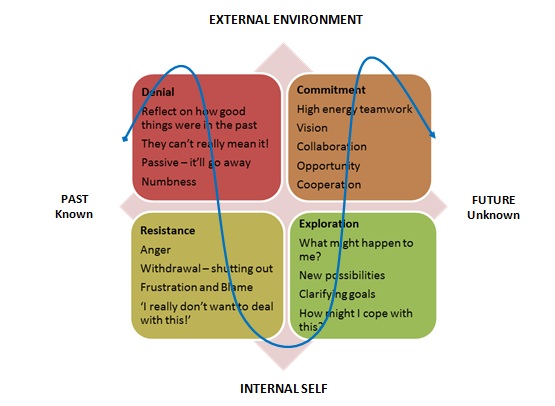‘If you can keep your head when all about you…’1
This line in Rudyard Kipling’s poem ‘If’ reminds me of the change that redundancy brings and the associated thoughts and feelings of wondering if I made the right decision, what will I do next, can I get another job, will I work again, how will I pay the bills, should I start up on my own, why me or who am I? What you experience will vary depending on the nature of the redundancy (voluntary or not), relationship with your employer, how the redundancy is handled, how you respond to change, the degree to which your work and career is a part of your identity and what else is going on in your life.
What you are experiencing is normal. The change curve demonstrates the typical stages one goes through when experiencing change. It is based on Kubler-Ross’s work on bereavement and is applicable to many sorts of change we experience in life including change programmes at work.2
On hearing the news, there may be an initial period of shock, followed by feelings of denial, numbness and/or passivity. This is referred to as the denial stage. The next stage, resistance, is characterised by a focus on the individual’s internal world, feelings of anger, frustration and blame, and possibly withdrawal. A common response is ‘why me?’ These two stages focus on the past.
The third stage is still characterised by a focus on the individual’s internal world, but the temporal focus starts shifts to the future and the unknown, an exploration of possibilities and what one might do. It is not uncommon for the unknown and hence uncertainty to foster excitement and/or anxiety, both which can be a source of creativity when designing new possibilities and goals. The final stage is commitment to the future demonstrated by having a vision of what you want and working towards it. It is characterised by a good enough acceptance (it does not have to be 100%) that your role (not you) has been made
redundant.
Every person’s experience of change is individual. Some people may progress through these stages in a linear fashion, others will go back and forth and/or skip some stages completely. There is no time limit for each stage. Some people may pass through a stage quickly or it may take a while. One might feel all the feelings associated with each stage or only some of them.
So now that you know which stage you may be at, what can you do? In the denial stage, get information, recognise that the change has happened and allow time to take it in. Find and create opportunities to talk about it with someone you trust who listens with empathy and without judgement. This is important in every stage. In the resistance phase, the feelings you experience may be strong at times. When losing a job, especially if it was an unwelcomed surprise, you experience something akin to bereavement. Acknowledge and express these feelings in a safe environment. Ask for help, encouragement and support. As you move into the exploration stage, ensure you have on-going support, set short-term goals, determine your priorities and focus on the future. In the commitment stage, build on the progress you have made by acknowledging and celebrating successes and setting longer-term goals which capitalise on your strengths.
Also, consider ‘putting your talents, knowledge, compassion and experience out there in a way that benefits others. It is restorative and puts positive energy back into the world. Be a good friend to yourself and do not overlook your finer qualities’. And in every stage, be alert to the positives, however small they may be. Hold on to them. Slow right down and ‘use relaxation and your own internal capacity for joy to feel that moment inside. Let it resonate within you’. This builds your internal capacity of self-acceptance, which you can draw on as you navigate this change.3
1 Kipling R., If. Available from http://www.kipling.org.uk/poems_if.htm (21 March 2012).
2 Kubler-Ross, E. (1969) On Death and Dying, UK: Tavistock Publications Ltd.
3 Wording in this paragraph taken from LeMaistre J. Dr. (1999) Coping with a Chronic Illness. Available http://www.alpineguild.com/COPING%20WITH%20CHRONIC%20ILLNESS.html, (2012, January 18).

